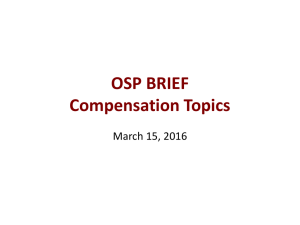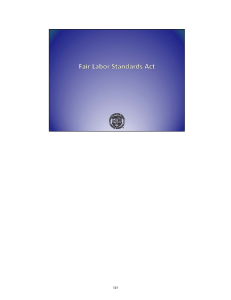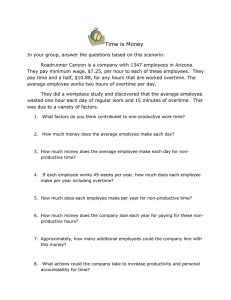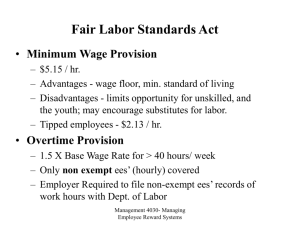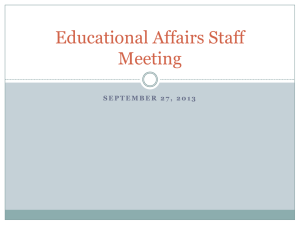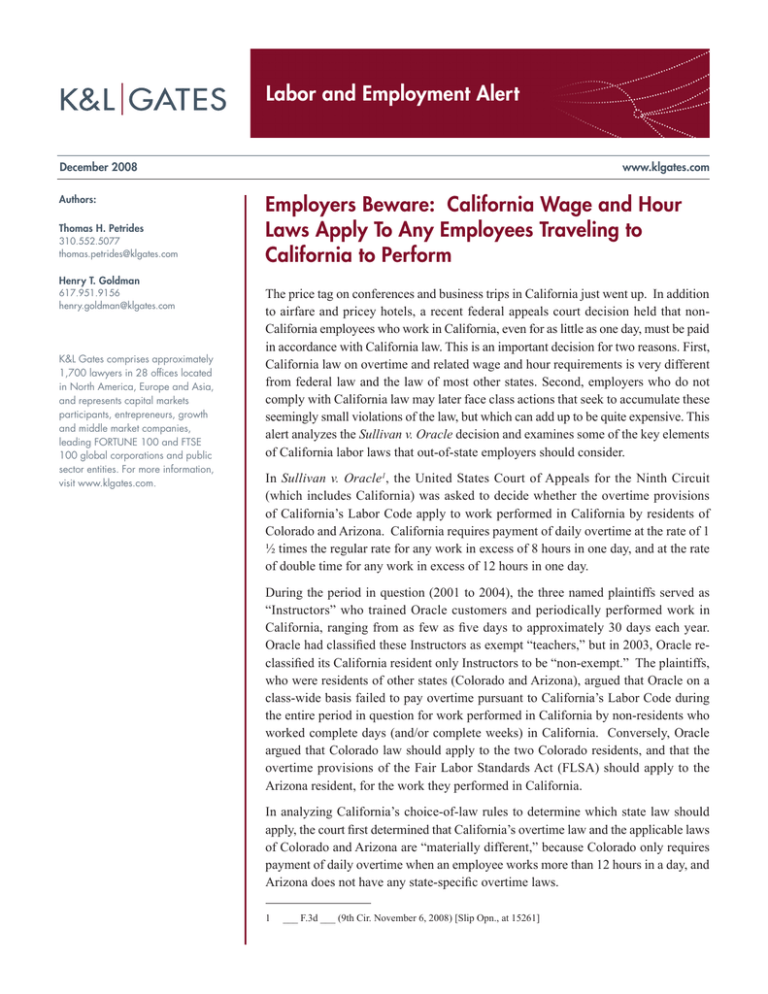
Labor and Employment Alert
December 2008
Authors:
Thomas H. Petrides
310.552.5077
thomas.petrides@klgates.com
Henry T. Goldman
617.951.9156
henry.goldman@klgates.com
K&L Gates comprises approximately
1,700 lawyers in 28 offices located
in North America, Europe and Asia,
and represents capital markets
participants, entrepreneurs, growth
and middle market companies,
leading FORTUNE 100 and FTSE
100 global corporations and public
sector entities. For more information,
visit www.klgates.com.
www.klgates.com
Employers Beware: California Wage and Hour
Laws Apply To Any Employees Traveling to
California to Perform Work in the State
The price tag on conferences and business trips in California just went up. In addition
to airfare and pricey hotels, a recent federal appeals court decision held that nonCalifornia employees who work in California, even for as little as one day, must be paid
in accordance with California law. This is an important decision for two reasons. First,
California law on overtime and related wage and hour requirements is very different
from federal law and the law of most other states. Second, employers who do not
comply with California law may later face class actions that seek to accumulate these
seemingly small violations of the law, but which can add up to be quite expensive. This
alert analyzes the Sullivan v. Oracle decision and examines some of the key elements
of California labor laws that out-of-state employers should consider.
In Sullivan v. Oracle1, the United States Court of Appeals for the Ninth Circuit
(which includes California) was asked to decide whether the overtime provisions
of California’s Labor Code apply to work performed in California by residents of
Colorado and Arizona. California requires payment of daily overtime at the rate of 1
½ times the regular rate for any work in excess of 8 hours in one day, and at the rate
of double time for any work in excess of 12 hours in one day.
During the period in question (2001 to 2004), the three named plaintiffs served as
“Instructors” who trained Oracle customers and periodically performed work in
California, ranging from as few as five days to approximately 30 days each year.
Oracle had classified these Instructors as exempt “teachers,” but in 2003, Oracle reclassified its California resident only Instructors to be “non-exempt.” The plaintiffs,
who were residents of other states (Colorado and Arizona), argued that Oracle on a
class-wide basis failed to pay overtime pursuant to California’s Labor Code during
the entire period in question for work performed in California by non-residents who
worked complete days (and/or complete weeks) in California. Conversely, Oracle
argued that Colorado law should apply to the two Colorado residents, and that the
overtime provisions of the Fair Labor Standards Act (FLSA) should apply to the
Arizona resident, for the work they performed in California.
In analyzing California’s choice-of-law rules to determine which state law should
apply, the court first determined that California’s overtime law and the applicable laws
of Colorado and Arizona are “materially different,” because Colorado only requires
payment of daily overtime when an employee works more than 12 hours in a day, and
Arizona does not have any state-specific overtime laws.
1
___ F.3d ___ (9th Cir. November 6, 2008) [Slip Opn., at 15261]
Labor and Employment Alert
The court then evaluated what interest each state
had in having its own law applied, and determined
that California had a strong interest in applying its
own Labor Code to the work being performed in
California by the non-resident employees, and that
Colorado and Arizona had not expressed any interest
in applying their wage laws to work performed by
its residents while working in California. Since
California had the stronger interest in applying its
law, and the interests of the other states were not
impaired by this result, the court concluded that the
overtime requirements of the California Labor Code
should be applied to the work being performed in
California by the non-resident employees.
The court also determined that application of the
California Labor Code under these circumstances
did not violate the Due Process Clause or the
Dormant Commerce Clause of the U.S. Constitution.
Although the court in Oracle had placed some
emphasis on the fact that Oracle had its headquarters
and principal place of business in California for
purposes of determining the choice of law analysis
and rejecting the Due Process Clause argument raised
by Oracle, it is not clear from the decision that this
factor alone, if different, would have been enough
for the court to have reached a different result.
Therefore, it appears that even a non-California
employer, with its headquarters and principal place
of business located outside of California, would still
have to comply with the California Labor Code in
connection with sending non-resident employees to
perform work in California.
Thus, under Oracle, non-residents who travel
into California to perform any work are subject to
California’s overtime laws, and not the laws of that
employee’s state. This ruling is very significant
for several different reasons. First, as noted above,
California requires payment of daily overtime for
non-exempt employees after 8 hours worked in one
day and at double time for any work in excess of 12
hours in one day, whereas most states and the FLSA
do not require the payment of any daily overtime,
but only weekly overtime after 40 hours.
Second, California has different rules than most
other states and the FLSA for determining whether
an employee is exempt or non-exempt for overtime
purposes. Consequently, an employee who may
properly be classified as exempt from overtime
under the FLSA or applicable state law may
nevertheless not qualify as exempt under California’s
more stringent exemption rules. For example, in
order to meet the “white collar” salary basis test
for exempt status under the FLSA, the employee
need only be paid a fixed salary of $455 per week
($23,660 annually), whereas under California law,
the employee must be paid a fixed salary of at least
$640 per week ($33,280 annually). Similarly, to
be exempt as a “computer professional” under
the FLSA, the employee must be paid an hourly
rate of at least $27.63 (or an annual salary of at
least $23,660), whereas under California law the
employee must be paid at least $36 per hour to
qualify for exempt status (or an annual salary of
at least $75,000). Additionally, the “duties test”
is often much more stringent under California law
than the FLSA for the administrative, executive,
professional, computer professional and outside sales
exemptions, and California does not even recognize
the “highly compensated” exemption of the FLSA.
Accordingly, even if the non-resident employees are
properly compensated, they still very well may not
meet the necessary tests to qualify for exempt status
under California law, even though properly classified
as exempt under the FLSA. This, of course, imposes
a formidable trap for the unwary employer who
is sending employees, otherwise believed to be
exempt, to perform work in California.
Finally, although the Oracle decision only dealt
specifically with the payment of overtime under
California Labor Code section 510, the court noted
December 2008
Labor and Employment Alert
that a prior California Supreme Court decision,
Tidewater Marine Western, Inc., v. Bradshaw2,
had previously held that “California’s employment
laws govern all work performed within the state,
regardless of the residence or domicile of the
worker.” Accordingly, by analogy, it may be inferred
that if other types of wage and hour claims were
asserted by non-resident employees in connection
with performing work in California, the Ninth
Circuit or a court sitting in California may likely
conclude that California’s choice of law rules would
dictate that the other protections of the California
Labor Code should also apply to those non-resident
employees.
Accordingly, employers should take care that
non-resident employees working in California are
compensated according to California’s labor laws.
For example, in addition to the daily overtime
requirements, California law also requires the
employer to provide non-exempt employees with
a 30-minute unpaid meal period if the employee
works more than five hours in a day, and if the
employee works more than 3-1/2 hours in a day, then
the employee is also allowed to take a 10-minute
paid rest break for every four hours worked, to be
taken insofar as practicable in the middle of each
4-hour period. Additionally, California’s minimum
wage for non-exempt employees is currently $8.00
per hour ($9.36 for employees working in San
Francisco), whereas the federal minimum wage is
only $6.55 per hour.
Significantly, failure to comply with California law
is very expensive, involving the possible payment of
additional premium wages, including the payment
of one additional hour of pay for each day that an
employee is prevented from taking a meal or rest
period, as well as possible civil penalties that may
be sought by any aggrieved employee on behalf of
all similarly situated employees. Also, many of
these claims would permit the prevailing employee
to recover attorney fees.
So, while a business trip to California may sound
like a nice perk for the employee, it may turn out
to be a much more expensive trip for the employer
than originally planned. Every employer that has
out-of-state employees traveling into California
should carefully evaluate and develop a plan to
assure compliance with California’s requirements.
2 14 Cal. 4th 557, 576 (1996)
K&L Gates comprises multiple affiliated partnerships: a limited liability partnership with the full name K&L Gates LLP qualified in Delaware and
maintaining offices throughout the U.S., in Berlin, in Beijing (K&L Gates LLP Beijing Representative Office), and in Shanghai (K&L Gates LLP
Shanghai Representative Office); a limited liability partnership (also named K&L Gates LLP) incorporated in England and maintaining our London
and Paris offices; a Taiwan general partnership (K&L Gates) which practices from our Taipei office; and a Hong Kong general partnership (K&L
Gates, Solicitors) which practices from our Hong Kong office. K&L Gates maintains appropriate registrations in the jurisdictions in which its offices
are located. A list of the partners in each entity is available for inspection at any K&L Gates office.
This publication/newsletter is for informational purposes and does not contain or convey legal advice. The information herein should not be used
or relied upon in regard to any particular facts or circumstances without first consulting a lawyer.
Data Protection Act 1998—We may contact you from time to time with information on K&L Gates LLP seminars and with our regular newsletters,
which may be of interest to you. We will not provide your details to any third parties. Please e-mail london@klgates.com if you would prefer not
to receive this information.
©1996-2008 K&L Gates LLP. All Rights Reserved.
December 2008


